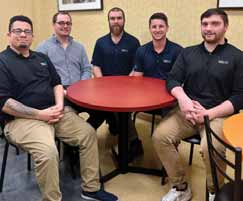
From left to right: Vacuum Barrier Corporation Field Service Engineers Joseph Downey, Tyler Jordan, Austin Henderson, Robert Long, and Aaron Moore.
For more than 60 years, Vacuum Barrier Corporation (VBC) has been an industry leader in LN2 dosing and piping systems; designing, engineering and fabricating systems for the food and beverage industries, such as bottled water, beer, wine and coffee; for semiconductor growth and testing; for pharmaceutical and biotech; and in the cannabis industry. VBC prides itself on investigating its clients’ unique applications and providing a custom solution, with a focus on being a one-stop source for complete, safe and defect-free LN2 systems.
One of the keys to meeting their customers’ needs is VBC’s Field Service team. Made up of field service engineers (FSEs), the service team is responsible for providing technical support and troubleshooting assistance for both new and existing systems. While remote support is often sufficient, many new systems require on-site equipment, start-up support and detailed operator training. Traveling to customer sites on a weekly basis, the FSEs become the face of the company.
Technically minded and able to work independently and under pressure, a good field service engineer must also be personable. “We may be the only face-to-face experience a customer has with Vacuum Barrier,” says Field Service Engineer Austin Henderson. “It is imperative that we develop trust quickly and build a strong relationship with customers.”
“Liquid nitrogen systems are a niche subject and can differ significantly compared to traditional systems and equipment,” adds Field Service Engineer Tyler Jordan. “It is essential that new customers learn these systems quickly and have a complete understanding. That task falls to us.”
When a customer purchases and installs a new system, the FSEs are there to ensure a smooth start-up process. “While we’re often not present to install the equipment, we are there for the final inspection and to verify that everything is installed correctly,” explains VBC Field Service Engineer Robert Long, who is joined on the team by Aaron Moore. “All VBC field service engineers include customer training as one of their top responsibilities,” says Moore. Maintenance procedures and troubleshooting steps are reviewed to reduce minor issues, and routine visits can be scheduled to inspect and perform maintenance, further minimizing any potential for downtime.
Minimizing downtime is a goal of any production facility, and is a top priority for VBC. When there are issues with installed equipment that cannot be easily addressed over the phone, field service engineers are ready to travel. “We are the experts in the field on our systems, and are prepared for any issue that may arise. We are able to address any questions or concerns,” says VBC Field Service Engineer Joseph Downey. “There is no time to ‘guess.’ The problem must be identified and resolved quickly.”
A common assumption is that field service engineers just repair equipment, but there’s far more to the role. They are the key to maintaining Vacuum Barrier’s high level of customer service.
VBC vacuum jacketed piping systems are available in both dynamic vacuum, which requires a vacuum pump, as well as sealed vacuum. This vacuum insulation is highly efficient and limits liquid nitrogen boiloff. Complete system design takes into account all factors of a customer’s application.
Among pharmaceutical and biotech applications, VBC’s SEMIFLEX®/Triax piping system delivers low pressure LN2 , critical for the cryogenic preservation of blood, reproductive cells, vaccines and other biological tissues and materials in storage freezers. Additionally, VBC offers specialized solutions for molecular beam epitaxy (MBE), an epitaxy method for thin film deposition of single molecular layer. A combination of modulating inlet phase separators and Triax piping ensures that subcooled, single-phase LN2 circulates through a shroud.
A significant number of VBC applications utilize NITRODOSE® LN2 injection systems to either pressurize cans and bottles for products that are not carbonated or to reduce oxygen in the container. Pressurizing the container ensures that the product can be stored, palletized and shipped due to its increased structural integrity. Oxygen inerting promotes longer shelf life and freshness, typically for snack foods, cooking oils and in the growing cannabis industry. The beer and coffee industries may use LN2 dosing to create nitrogenated products which, when poured properly, create a foamy head and smooth mouthfeel.
For more information about Vacuum Barrier Corporation’s customer service and field service engineers, or to better understand the VBC family of products, visit www.vacuumbarrier.com.
